- Home
- Salman Rushdie
Two Years Eight Months and Twenty-Eight Nights Page 2
Two Years Eight Months and Twenty-Eight Nights Read online
Page 2
As Dunia filled up with children and then emptied them into the small house, there was less room for Ibn Rushd’s excommunicated “lies.” Their moments of intimacy decreased and money became a problem. “A true man faces the consequences of his actions,” she told him, “especially a man who believes in causes and effects.” But making money had never been his forte. The horse-trading business was treacherous and full of cutthroats and his profits were small. He had many competitors in the tinaja market, so prices were low. “Charge your patients more,” she advised him with some irritation. “You should cash in on your former prestige, tarnished as it is. What else have you got? It’s not enough to be a baby-making monster. You make babies, the babies come, the babies must be fed. That is ‘logic.’ That is ‘rational.’ ” She knew which words she could turn against him. “Not to do this,” she cried triumphantly, “is ‘incoherence.’ ”
(The jinn are fond of glittering things, gold and jewels and so on, and often they conceal their hoards in subterranean caves. Why did the jinnia princess not cry Open at the door of a treasure cave and solve their financial problems at a stroke? Because she had chosen a human life, a human partnership as the “human” wife of a human being, and she was bound by her choice. To have revealed her true nature to her lover at this late stage would have been to reveal a kind of betrayal, or lie, at the heart of their relationship. So she remained silent, fearing he might abandon her. But, in the end, he left her anyway, for human reasons of his own.)
There was a Persian book called Hazar Afsaneh, or One Thousand Stories, which had been translated into Arabic. In the Arabic version there were fewer than one thousand stories but the action was spread over one thousand nights, or, because round numbers were ugly, one thousand nights and one night more. He had not seen the book but several of its stories had been told to him at court. The story of the fisherman and the jinni appealed to him, not so much for its fantastic elements (the jinni from the lamp, the magic talking fishes, the bewitched prince who was half man and half marble), but for its technical beauty, the way stories were enfolded within other stories and contained, folded within themselves, yet other stories, so that the story became a true mirror of life, Ibn Rushd thought, in which all our stories contain the stories of others and are themselves contained within larger, grander narratives, the histories of our families, or homelands, or beliefs. More beautiful even than the stories within stories was the story of the storyteller, a princess called Shahrazad or Scheherazade, who told her tales to a murderous husband to prevent herself from being executed. Stories told against death, to civilize a barbarian. And at the foot of the marital bed sat Shahrazad’s sister, her perfect audience, asking for one more story, and then one more, and then yet another. From this sister’s name Ibn Rushd got the name he bestowed on the hordes of babies issuing from his lover Dunia’s loins, for the sister, as it happened, was called Dunyazad, “and what we have here filling up this house with no light and forcing me to impose extortionate fees on my patients, the sick and infirm of Lucena, is the arrival of the Dunia-zát, that is, Dunia’s tribe, the race of Dunians, the Dunia people, which, being translated, is ‘the people of the world.’ ”
Dunia was deeply offended. “You mean,” she said, “that because we are not married our children cannot bear their father’s name.” He smiled his sad crooked smile. “It is better that they be the Duniazát,” he said, “a name which contains the world and has not been judged by it. To be the Rushdi would send them into history with a mark upon their brow.” She began to speak of herself as Scheherazade’s sister, always asking for stories, only her Scheherazade was a man, her lover not her brother, and some of his stories could get them both killed if the words were accidentally to escape from the darkness of the bedroom. So he was a sort of anti-Scheherazade, Dunia told him, the exact opposite of the storyteller of The Thousand Nights and One Night: her stories saved her life, while his put his life in danger. But then the Caliph Abu Yusuf Yaqub was triumphant in war, winning his greatest military victory against the Christian king of Castile, Alfonso VIII, at Alarcos on the Guadiana River. After the Battle of Alarcos, in which his forces killed 150,000 Castilian soldiers, fully half the Christian army, the Caliph gave himself the name Al-Mansur, the Victorious, and with the confidence of a conquering hero he brought the ascendancy of the fanatical Berbers to an end, and summoned Ibn Rushd back to court.
The mark of shame was wiped off the old philosopher’s brow, his exile ended; he was rehabilitated, un-disgraced, and returned with honor to his old position of court physician in Córdoba, two years, eight months and twenty-eight days and nights after his exile began, which was to say, one thousand days and nights and one more day and night; and Dunia was pregnant again, of course, and he did not marry her, of course, he never gave her children his name, of course, and he did not bring her with him to the Almohad court, of course, so she slipped out of history, he took it with him when he left, along with his robes, his bubbling retorts, and his manuscripts, some bound, others in scrolls, manuscripts of other men’s books, for his own had been burned, though many copies survived, he told her, in other cities, in the libraries of friends, and in places where he had concealed them against the day of his disfavor, for a wise man always prepares for adversity, but, if he is properly modest, good fortune takes him by surprise. He left without finishing his breakfast or saying goodbye, and she did not threaten him, did not reveal her true nature or the power that lay hidden within her, did not say, I know what you say aloud in your dreams, when you suppose the thing that would be stupid to suppose, when you stop trying to reconcile the irreconcilable and speak the terrible, fatal truth. She allowed history to leave her without trying to hold it back, the way children allow a grand parade to pass, holding it in their memory, making it an unforgettable thing, making it their own; and she went on loving him, even though he had so casually abandoned her. You were my everything, she wanted to say to him, you were my sun and moon, and who will hold my head now, who will kiss my lips, who will be a father to our children, but he was a great man destined for the halls of the immortals, and these squalling brats were no more than the jetsam he left in his wake.
One day, she murmured to the absent philosopher, one day long after you are dead you will reach the moment at which you want to claim your family, and at that moment, I, your spirit wife, will grant your wish, even though you have broken my heart.
It is believed that she remained among human beings for a time, perhaps hoping against hope for his return, and that he continued to send her money, that maybe he visited her from time to time, and that she gave up on the horse business but went on with the tinajas, but now that the sun and moon of history had set forever on her house, her story became a thing of shadows and mysteries, so maybe it’s true, as people said, that after Ibn Rushd died his spirit returned to her and fathered even more children. People also said that Ibn Rushd brought her a lamp with a jinni in it and the jinni was the father of the children born after he left her—so we see how easily rumor gets things upside down! And they also said, less kindly, that the abandoned woman took in any man who would pay her rent, and every man she took in left her with another brood, so that the Duniazát, the brood of Dunia, were no longer bastard Rushdis, or some of them were not, or many of them were not, or most; for in most people’s eyes the story of her life had become a stuttering line, its letters dissolving into meaningless forms, incapable of revealing how long she lived, or how, or where, or with whom, or when and how—or if—she died.
Nobody noticed or cared that one day she turned sideways and slipped through a slit in the world and returned to Peristan, the other reality, the world of dreams whence the jinn periodically emerge to trouble and bless mankind. To the villagers of Lucena she seemed to have dissolved, perhaps into fireless smoke. After Dunia left our world the voyagers from the world of the jinn to ours became fewer in number, and then for a long time they stopped coming completely, and the slits in the world became overgrown by the uni
maginative weeds of convention and the thornbushes of the dully material, until they finally closed up completely and our ancestors were left to do the best they could without the benefits or curses of magic.
But Dunia’s children thrived. That much can be said. And almost three hundred years later, when the Jews were expelled from Spain, even the Jews who could not say they were Jews, the children of Dunia’s children climbed into ships in Cádiz and Palos de Moguer, or walked across the Pyrenees, or flew on magic carpets or in giant urns like the jinni kin they were, they traversed continents and sailed the seven seas and climbed high mountains and swam mighty rivers and slid into deep valleys and found shelter and safety wherever they could, and they forgot one another quickly, or remembered as long as they could and then forgot, or never forgot, becoming a family that was no longer exactly a family, a tribe that was no longer exactly a tribe; adopting every religion and no religion, many of them, after the centuries of conversion, ignorant of their supernatural origins, forgetting the story of the forcible conversion of the Jews, some of them becoming manically devout while others were contemptuously disbelieving; a family without a place but with family in every place, a village without a location, but winding in and out of every location on the globe, like rootless plants, mosses or lichens or creeping orchids, who must lean upon others, being unable to stand alone.
History is unkind to those it abandons, and can be equally unkind to those who make it. Ibn Rushd died (conventionally, of old age, or so we believe) while traveling in Marrakesh barely a year after his rehabilitation, and never saw his fame grow, never saw it spread beyond the borders of his own world into the infidel world beyond, where his commentaries on Aristotle became the foundations of his mighty forebear’s popularity, the cornerstones of the infidels’ godless philosophy, called saecularis, meaning the kind of idea that only came once in a saeculum, an age of the world, or maybe an idea for the ages, and which was the very image and echo of the ideas he had only spoken in dreams. Perhaps, as a godly man, he would not have been delighted by the place history gave him, for it is a strange fate for a believer to become the inspiration of ideas that have no need for belief, and a stranger fate still for a man’s philosophy to be victorious beyond the frontiers of his own world but vanquished within those borders, because in the world he knew it was the children of his dead adversary Ghazali who multiplied and inherited the kingdom, while his own bastard brood spread out, leaving his forbidden name behind them, to populate the earth. A high proportion of the survivors ended up in the great North American continent, and many others in the great South Asian subcontinent, thanks to the phenomenon of “clumping” that is a part of the mysterious illogic of random distribution; and many of those afterwards spread out west and south across the Americas, and north and west from that great diamond at the foot of Asia, into all the countries of the world, for of the Duniazát it can fairly be said that, as well as peculiar ears, they all have itchy feet. And Ibn Rushd was dead, but, as will be seen, he and his adversary continued their dispute beyond the grave, for to the arguments of great thinkers there is no end, the idea of argument itself being a tool to improve the mind, the sharpest of all tools, born of the love of knowledge, which is to say, philosophy.
Eight hundred and more years later, more than three and a half thousand miles away, and now more than one thousand years ago, a storm fell upon our ancestors’ city like a bomb. Their childhoods slipped into the water and were lost, the piers built of memories on which they once ate candy and pizza, the boardwalks of desire under which they hid from the summer sun and kissed their first lips. The roofs of houses flew through the night sky like disoriented bats, and the attics where they stored their past stood exposed to the elements until it seemed that everything they once were had been devoured by the predatory sky. Their secrets drowned in flooded basements and they could no longer remember them. Their power failed them. Darkness fell.
Before the power died the TV showed images taken from the sky of an immense white spiral wheeling overhead like an invading alien spaceship. Then the river poured into the power stations and trees fell on the power cables and crushed the sheds where the emergency generators were housed and the apocalypse began. Some rope that moored our ancestors to reality snapped, and as the elements screamed in their ears it was easy for them to believe that the slits in the world had reopened, the seals had been broken and there were laughing sorcerers in the sky, satanic horsemen riding the galloping clouds.
For three days and nights nobody spoke because only the language of the storm existed and our ancestors did not know how to speak that awful tongue. Then at last it passed, and like children refusing to believe in childhood’s end they wanted everything to be as it was. But when the light returned it felt different. This was a white light they had not seen before, harsh as an interrogator’s lamp, casting no shadows, merciless, leaving no place to hide. Beware, the light seemed to say, for I come to burn and judge.
Then the strangenesses began. They would continue for two years, eight months and twenty-eight nights.
This is how it has come down to us, a millennium later, as history infused with and perhaps overwhelmed by legend. This is how we think of it now, as if it were a fallible memory, or a dream of the remote past. If it’s untrue, or partly untrue, if made-up stories have been introduced into the record, it’s too late to do anything about it. This is the story of our ancestors as we choose to tell it, and so, of course, it’s our story too.
It was on the Wednesday after the great storm that Mr. Geronimo first noticed that his feet no longer touched the ground. He had awoken an hour before dawn as usual, half-remembering a strange dream in which a woman’s lips were pressed against his chest, murmuring inaudibly. His nose was blocked, his mouth dry because he’d been breathing through it in his sleep, his neck stiff thanks to his habit of putting too many pillows beneath it; the eczema on his left ankle needed to be scratched. The body in general was giving him the familiar amount of morning grief: nothing to moan about, in other words. The feet, in fact, felt fine. Mr. Geronimo had had trouble with his feet for much of his life, but they were being kind today. From time to time he suffered the pain of his fallen arches, even though he meticulously did his toe-clenching exercises last thing at night before going to sleep and first thing after waking up, and he wore insoles, and went up and down stairs on his toes. Then there was the battle with gout, and the medication that brought on diarrhea. The pain came periodically and he accepted it, consoling himself with what he had learned as a young man: that flat feet allowed you to dodge the military draft. Mr. Geronimo was long past the soldiering age but this scrap of information still comforted him. And gout after all was the disease of kings.
Lately his heels had been forming thick, cracked calluses that needed attention, but he had been too busy to visit a podiatrist. He needed his feet, was on them all day. Also, they had had a couple of days of rest, no gardening to be done during a storm like this one, so perhaps they were rewarding him, this morning, by choosing not to make a fuss. He swung his legs out of bed and stood up. Something did feel different then. He was familiar with the texture of the polished wooden floorboards in his bedroom but for some reason he didn’t feel them that Wednesday morning. There was a new softness underfoot, a kind of soothing nothingness. Maybe his feet had become numb, deadened by the thickening calluses. A man of his type, an older man with a day of hard physical work ahead of him, did not bother with such trifles. A man of his type, big, fit, strong, shrugged off niggles and got on with his day.
There was still no power and very little water, though the return of both was promised for the next day. Mr. Geronimo was a fastidious person and it pained him not to clean his teeth thoroughly, not to shower. He used some of the water that remained in his bathtub to flush the toilet. (He had filled it as a precaution before the storm began.) He climbed into his work overalls and boots and, ignoring the stalled elevator, ventured down into the ruined streets. At sixty-plus, he told himsel
f, having reached an age at which most men would be putting their feet up, he was as fit and active as he’d ever been. The life he chose long ago had seen to that. It had taken him away from his father’s church of miracle cures, of screaming women rising from wheelchairs because possessed by the power of Christ, and away too from his uncle’s architectural practice where he might have spent long invisible sedentary years drafting that kindly gentleman’s unrecognized visions, his floor plans of disappointments and frustrations and things that might have been. Mr. Geronimo had left Jesus and drafting tables behind and moved into the open air.
In the green pickup truck, on whose sides the words Mr. Geronimo Gardener and a phone number and website URL were blocked out in yellow and drop-shadowed in scarlet, he couldn’t feel the seat under him; the cracked green leather that usually poked comfortingly into the right cheek of his behind wasn’t doing its thing today. He was definitely not himself. There was a general lessening of sensation. This was a worry. At his age, and given his chosen field of work, he had to be concerned about the small betrayals of the body, had to deal with them, to stave off the larger betrayals that awaited. He would have to get himself checked out, but not now; right now, in the aftermath of the storm, the doctors and hospitals had bigger problems to worry about. The accelerator and brake felt oddly cushioned beneath his booted feet, as if they needed a little extra pressure from him this morning. The storm had evidently messed with the psyches of motor vehicles as well as human beings. Cars lay abandoned, despondent, at odd angles beneath broken windows, and there was a melancholy yellow bus on its side. The main roads had been cleared, however, and the George Washington Bridge had reopened for traffic. There was a gas shortage but he had hoarded his own supply and reckoned he would be able to cope. Mr. Geronimo was a hoarder of fuel, gas masks, flashlights, blankets, medical supplies, canned food, water in lightweight packets; a man who expected emergencies, who counted on the fabric of society to tear and disintegrate, who knew that superglue could be used to hold cuts together, who did not trust human nature to build solidly or well. A man who expected the worst. Also a superstitious man, a crosser of fingers, who knew, for example, that in America wicked spirits lived in trees so it was necessary to knock on wood to drive them out, whereas British tree-spirits (he was an admirer of the British countryside) were friendly creatures so one touched wood to get the benefit of their benevolence. These things were important to know. One couldn’t be too careful. If you walk away from God you should probably try to stay in the good books of Luck.

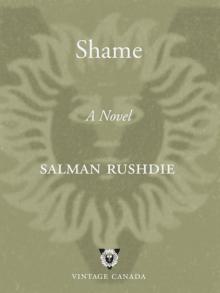 Shame
Shame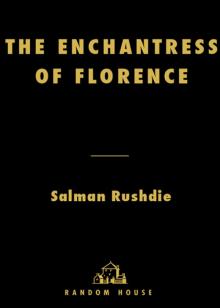 The Enchantress of Florence
The Enchantress of Florence Imaginary Homelands: Essays and Criticism 1981-1991
Imaginary Homelands: Essays and Criticism 1981-1991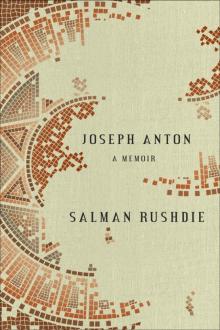 Joseph Anton: A Memoir
Joseph Anton: A Memoir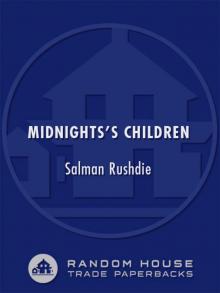 Midnight's Children
Midnight's Children East, West: Stories
East, West: Stories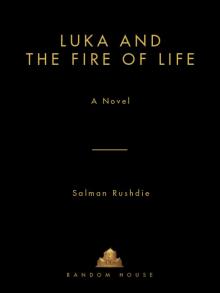 Luka and the Fire of Life
Luka and the Fire of Life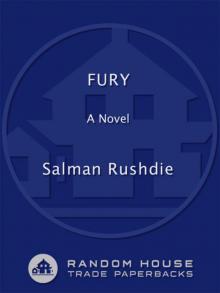 Fury Fury Fury
Fury Fury Fury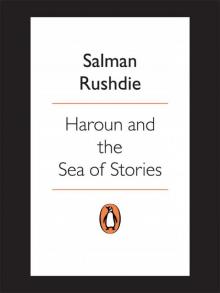 Haroun and the Sea of Stories
Haroun and the Sea of Stories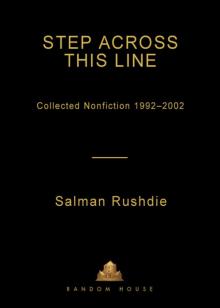 Step Across This Line: Collected Nonfiction 1992-2002
Step Across This Line: Collected Nonfiction 1992-2002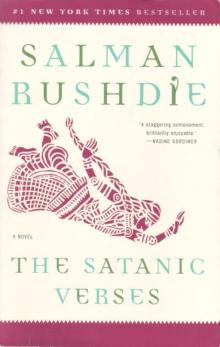 The Satanic Verses
The Satanic Verses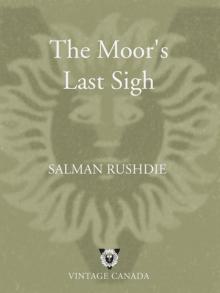 The Moor's Last Sigh
The Moor's Last Sigh The Prophet's Hair
The Prophet's Hair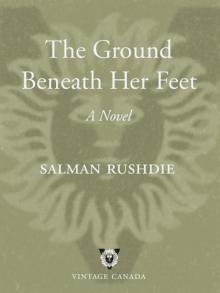 The Ground Beneath Her Feet
The Ground Beneath Her Feet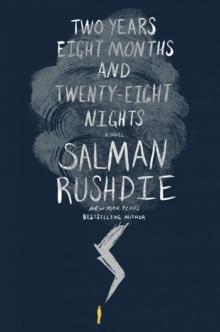 Two Years Eight Months and Twenty-Eight Nights
Two Years Eight Months and Twenty-Eight Nights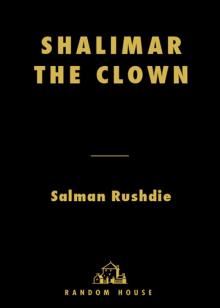 Shalimar the Clown
Shalimar the Clown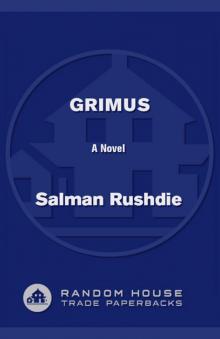 Grimus
Grimus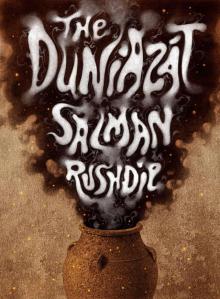 The Duniazát
The Duniazát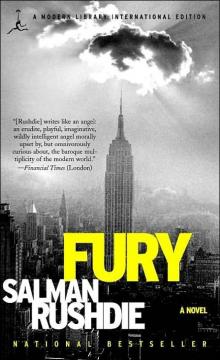 Fury
Fury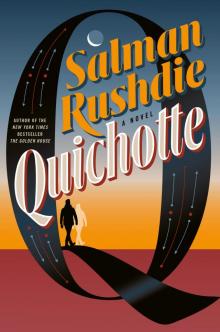 Quichotte
Quichotte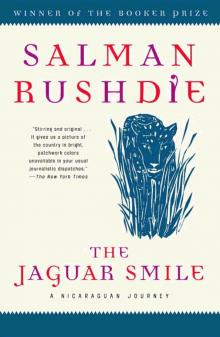 The Jaguar Smile
The Jaguar Smile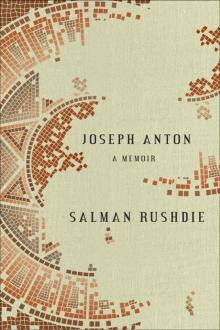 Joseph Anton
Joseph Anton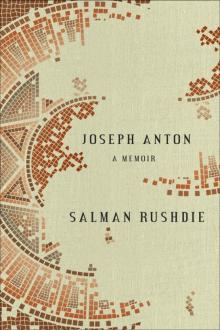 Joseph Anton: A Memoir: A Memoir
Joseph Anton: A Memoir: A Memoir Imaginary Homelands
Imaginary Homelands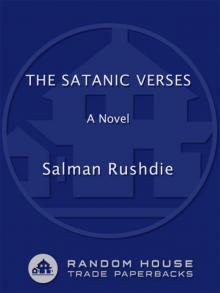 The Satanic Verses: A Novel
The Satanic Verses: A Novel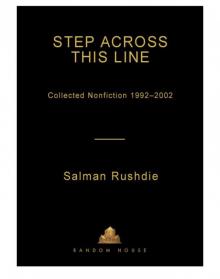 Step Across This Line
Step Across This Line East, West
East, West